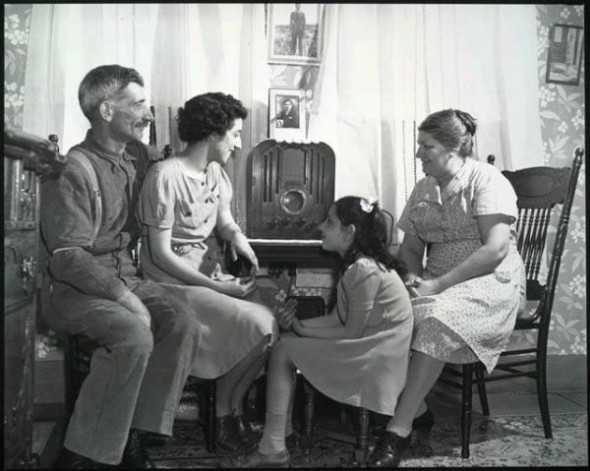As Podcast Week marches on, John Perich contemplates what the historians of the future will make of our current Golden Age of Podcasting.
“Do you feel these stone implements occupied a central place in the lives of their makers? Say no.”
“No.”
“Why not?”
[…]
“[T]rapping or driving animals with fire would be more effective than hunting; and anyway stone tools wouldn’t be needed at all for gathering berries and the shoots of edible plants and things like that, which were probably their most important food—those stone things got in the glass case here because the snares and nets rotted away and they’re all that’s left, so the people that make their living that way pretend they were important.”– Gene Wolfe, “The Fifth Head of Cerberus”
One of the great mysteries surrounding Homer, author of The Illiad and The Odyssey, is who Homer actually was. Because of the extreme antiquity of his work, we have no idea what he sounded like, whether he was one person or an amalgam of several, or whether he was even truly a he. The texts we most often associate with him are transcriptions of an oral tradition that may not even have been jotted down while he was alive. And the events about which he told stories – the sack of Troy, the founding of Rome – were at least a century in his past.
His work survives, but we know, if we consider the math and the circumstances, that he must have had dozens or hundreds of contemporaries whose work does not. There is not just one generation, but many generations, who could have produced work as imaginative and stirring as Homer’s, but who are forever lost to us. What stories did they tell? Which heroes did they enshrine? What would our contemporary ideas of heroism and civilization look like if Homer’s peers had survived as well as, or instead of, Homer?
How many ages hence
Shall this our lofty scene be acted over,
In states unborn and accents yet unknown!– William Shakespeare, Julius Caesar, Act 3, Scene 1
In 1982, the Royal Shakespeare Company produced a series for London Weekend Television called Playing Shakespeare. Hosted by John Barton, co-founder and director of the RSC, it was set in a cozy theatre backstage and was part lecture, part scenework. Barton would talk about the nature of Shakespeare’s plays and how different actors might approch them, and then turn to some of his actors—a shockingly young Judi Dench, Ian McKellen, Ben Kingsley, or Patrick Stewart among them—and coach them through a short scene.
The third episode, “Language and Character,” is one of my favorites. In it, Barton talks about discovering Shakespearean character through language. Shakespeare wrote much of his work in blank verse—iambic pentameter, da-dum-da-dum, da-dum-da-dum, da-dum—to make it easier for busy actors to memorize. Rather than undertaking weekend retreats or freewriting exercises to discover one’s character, an actor might have relied on the text itself. Am I using soft and sibilant sounds to describe the fall of night? Am I delivering a bunch of short lines with emphasis to establish anger and shock? Am I using contrasting and contraposed images? And so on.
The challenge, as episode #3 illustrates, is that we don’t speak the same way Elizabethan actors did. We only have a sense of Elizabethan speech because we can see lines of verse that are supposed to rhyme and scan and deduce the rhyming and pronunciation from there, and because the work of Shakespeare has been performed constantly, with occasional interruptions, over the last four centuries. Were it not for that, we might have no idea how English actors spoke in the 1600s—and even with that, we’re guessing.
And even here, the record is incomplete. We know that Shakespeare’s Hamlet was likely inspired by a very popular play from only a few years earlier, but no record of that play exists. Scholars refer to it as the “Ur-Hamlet”, a literary placeholder that glosses over our complete amnesia. Imagine historians in the year 2410, trying to piece together the cinematic origins of Basic Instinct but having no record of Vertigo. “Sharon Stone’s white dress and blond coif signify something, but what?”
So much of the English language’s present sense of drama, of tragedy, and of poetic language stems from the work of one British playwright from the 16th century. But he didn’t operate in a vacuum. He wrote in the company of, inspired by, and in response to equally talented contemporaries—Thomas Kyd, Christopher Marlowe, Ben Jonson, and others. But few people outside the academy know their work half as well, whereas “to be or not to be” is known enough that you can build a Sesame Street sketch around it. And there are doubtless contemporaries whose work has not survived at all. And the only reason we have as much of Shakespeare’s corpus as we do is because people took the effort to write some of it down. Shakespeare didn’t sell his work to the Random House of his day and distribute it through Barnes & Noble.
When Shakespeare died, Jonson famously said he was “not of an Age, but for all time.” But that was never a sure thing.
Tech giant Google says it will hide content removed under the “right to be forgotten” from all versions of the search engine when viewed from countries where removal was approved.
Under the “right to be forgotten” ruling, EU citizens may ask search engines to remove information about them. Now, removed results will not appear on any version of Google. EU privacy regulators previously asked the firm to do this.– BBC, “Google takes wider action on ‘right to be forgotten”, 11 February 2016
Five and a half years ago, Eric Schmidt, CEO of Google, made an observation at a tech conference that didn’t terrify as many people as it should have.
Consider the sum total of information generated by the human species, from the dawn of civilization into 2003. As of 2010, the human species generated just as much information every two days. Every two days, humanity duplicated ten thousand years of culture. And this was five and a half years ago. Twitter only had 49 million monthly active users; Instagram hadn’t even hit 1 million yet. Vine would not exist for 2 more years; Snapchat had not yet been submitted as an idea in a Stanford product design class. The sheer volume of information generated can only have gone up since then.
It seems impossible. The scale is incomprehensible, like the distance from the Earth to Jupiter, or the heat of the sun. But it makes more sense when you realize that, in this century, fifteen percent of the planet carries with them a computer that can instantly generate and archive hi-resolution photos, music, or video. With a little more effort, they can create texts that rival Homer or Shakespeare in density, if not quality. And they can reach a wider audience in a day than either bard did while they lived.
I could add another hundred thousand words to this pile myself, writing a blog post about the surfeit of blog posts, image memes, short videos, and mashed-up songs that dominate the digital library. But, since this is podcast week, I will focus on podcasts.
America’s Golden Age of Radio, from the Twenties through the Fifties, was marked by the dominance of four major networks: NBC, CBS, ABC, and the Mutual Broadcasting system. Let’s do some back of the envelope math and presume that they broadcast enough material to fill every hour of the day, every day of the year. That’s 365x24x4 = 35,040 hours of original audio every year. Let’s presume further that the national networks only accounted for 50% of radio broadcasts – that regional or unaffiliated stations produced another 35,040 hours of audio on top of that (an unfairly generous assumption). That’s over 70,000 hours of original audio being produced every year.

Subjecting “King Biscuit Time” to a level of scrutiny it probably doesn’t deserve
How do podcasts compare? According to a Pew Research Center survey from April 2015, Libsyn, the world’s largest podcasting network, hosted 22,000 podcasts in 2014. If each of them produced one hour of material per month – not per week; let’s be conservative – that’s 220,000 hours of original audio, or 2.6 million hours per year. Libsyn’s independent producers generate 37 times what the Big Four may have managed.
(And even this is a soft assumption, since many of the Golden Age of Radio’s 70,000 hours would have been music. It wasn’t all talk all the time.)
Now, all of this says nothing about how many podcasts are downloaded, or listened to, or eagerly touted to one’s friends. But I’m not interested in that for the purposes of this discussion. I’m solely focusing on how much is being produced. By my own paltry estimates, podcasting media produces 20 to 30 times as much content as old-time radio – the last big nationally syndicated audio-only format.
The glib response – “yeah, but most of that is pablum” – is 100% accurate. Aside from our indispensable podcast and maybe eight or thirteen others, most podcasts will tell you nothing you haven’t heard or hadn’t considered. But most of what we consider culture – shared stories and experiences surrounding familiar observations across boundaries artificial and real – consists of that sort of mundanity. Culture isn’t all Marcus Aurelius treatises and The Federalist Papers and Haydn. It’s bathroom graffiti and pulp literature and popular songs. It’s memes and macros and inside jokes. It’s the stuff that you absorb every day, like an unconscious sponge, and that historians would love to be able to document.
But let’s say we only focus on the “important” podcasts. Let’s consider Serial, the 2014 podcast that became a pop cultural phenomenon. Historians and sociologists who look back at the 2010s will doubtless want to slot the first season of Serial somewhere between #BlackLivesMatter and wherever the increased focus on crime and punishment takes us (I can’t predict! we’re too much in the moment to tell!). By getting millions of listeners to follow fervently a long-closed murder case, Serial either contributed to or rode along with a rising awareness of the “imperfect mechanism” that, to quote Raymond Chandler, is the law.
So I’m a well-paid adjunct professor in the year 2112, and I want to share Serial with my students when we get to this period of history. How do I do it?
When mp3 is abandoned as a format – and every digital format will eventually fade – will NPR put in the time and effort to remaster Serial to the new medium? When that medium fades in turn, will someone recopy it again? It’s not hard to do; just put an intern on it! But the New Era of Content demands such a ceaseless, costless churning of diversion for the middle class audience that I could easily imagine it being overlooked.
And that’s just for Serial, a podcast of acknowledged historical importance. Who’s going to remaster 99 Percent Invisible? Or Radiolab? Or Rose Eveleth’s Flash Forward? Or The Moth? Or Night Vale? Or, perhaps most importantly, a podcast that subjects the popular culture to a level of scrutiny it probably doesn’t deserve?
And that’s presuming nothing unforeseen happens to digital media. On a long enough timeline, a major solar flare capable of wiping every server on Earth like a magnet is inevitable. Lloyd’s estimates that these things are on a 150-year cycle, and if the 2012 storm that missed us was our last one, then we as a species have 150 years to develop a recording medium that doesn’t rely on the electromagnetic spectrum. You’ve seen how environmental news goes over in the popular press; do you like our chances?
Whether you like the plausible scenario or the extreme one, we are looking at the inevitable obsolescence of millions of hours of primary sources of life in the 21st Century. We can preserve some fraction of it but not all of it. And yet the engine continues to churn. More people start podcasts every day. It’s as if the fire that consumed the Library of Alexandria were a bonfire that was maintained in the courtyard for ten years, until one day whoops!

Adam Carolla’s worst nightmare
You may be snickering into your sleeve that history wouldn’t be much diminished if ninety percent of all podcasts were lost. But that’s because you’re awash in 21st Century culture now. You’re suffused with it. To future historians that may be desperately curious what the 21st Century was like, such documentation – vocal fry, live reads for Stamps.com [This is not a paid placement, by the way -Ed.], and all – may be as dear as sapphires. If we were writing it down, we’d have a medium that future generations could at least read. If we were consciously repeating it as an oral tradition, there’d be a chance it could survive as folklore. But we’re mumbling it into our headset mics and storing it on the cloud (that is to say, someone else’s computer). We are casting it into the wind.
Our social order produces countless terabytes of media every day. Per Eric Schmidt’s estimate, we’re doubling human history three times a week. Podcasts may not be the most crucial part of it, but they’re an indisputable part: a shared audio document of what humans find interesting enough to talk about on record, usually for zero dollars, and distribute with the world. And it is not doomed to vanish in a few generations. It is certain.
Please fill out our survey. Please visit our sponsors. Leave us feedback in the comments.

You embedded the Playing Shakespeare episode that includes the Fry & Laurie parody sketch, excellent choice!
Have you heard of “Mr. Burns, a Post-Electric Play?” The first act is post-apocalyptic characters reconstructing a Simpsons episode from memory to kill time, the second act is the same characters putting on a stage play of that episode 7 years later after society has changed and this practice has replaced television, and the third act presents the hugely altered (and Ancient Greek Theatre style) version that exists 75 years later. It’s pretty amazing, and definitely gets you thinking about how information and culture does or does not get preserved.
The “Fifth Head of Cerberus” has got to be one of my favorite books of all time. Have you read much Gene Wolfe? None of the later stuff comes close to that and “Peace” for me. Of course with Wolfe, the very real possibility exists that I’ve completely missed everything important in them.
Yes to all three.
The most implausible part of this scenario is a well-paid adjunct professor in the year 2112.
This post made me sad. I sometimes catch myself imaging a future in which my grandchildren listen to me rant about Terminator on the Overthinking It podcast. I kind of saw my podcast output as a sort of ticket to immortality. How to stave off this descent into obscurity? I guess I’d better start cutting all of the podcasts to vinyl.
The most likely pieces to be preserved are the classics which so encapsulate an idea and section of culture as to immortalize it. One need not absorb an infinity of pablum to appreciate its concentration into a classic.